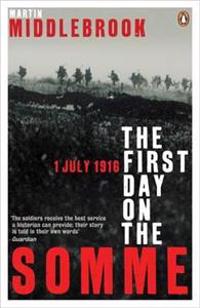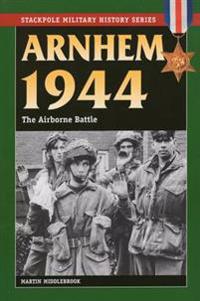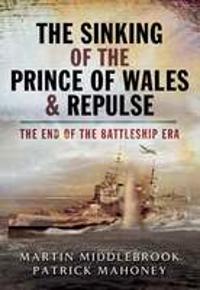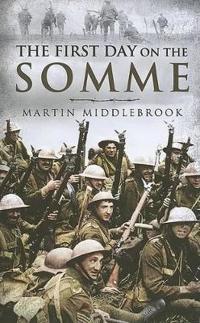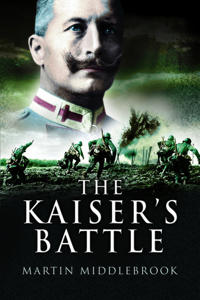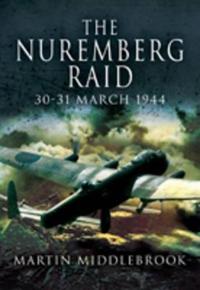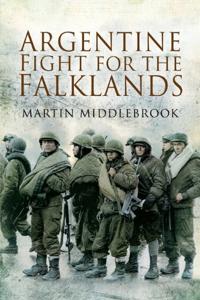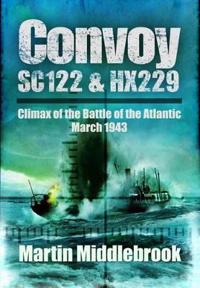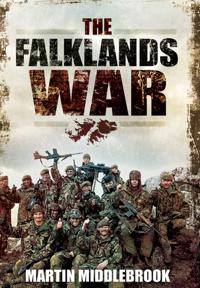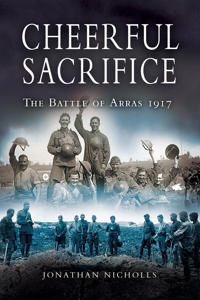The First Day on the Somme (Storpocket)
avMartin Middlebrook
ISBN: 9780140171341 - UTGIVEN: 1992-05Martin Middlebrook's "The First Day on the Somme" is a compelling and intensely moving account of the blackest day in the history of the British army. On 1 July, 1916, a continuous line of British soldiers climbed out from the trenches of the Somme into No Man's Land and began to walk slowly towards[...]
Arnhem 1944 (Pocket)
avMartin Middlebrook
ISBN: 9780811708265 - UTGIVEN: 2011-04Exciting overview of the World War II battle made famous by the classic movie and book A Bridge Too Far[...]
Sinking of the Prince of WalesRepulse (Häftad)
avMartin Middlebrook, Patrick Mahoney
ISBN: 9781844150755 - UTGIVEN: 2004-01On 10 December 1941 two Royal Navy capital ships were sunk off Malaya by air torpedo attack. They had not requested the air support that could have saved them and 840 men died. Taking full advantage of Second World War documents, the authors re-create not only what happened but also what it was like[...]
The Peenemünde Raid (Pocket)
avMartin Middlebrook
ISBN: 9781844153367 - UTGIVEN: 2006-06On the night of 17-18 August 1943, RAF Bomber Command attacked a remote research establishment on the German Baltic coast. The site was Peenemunde, where Hitler's scientists were developing both the V-1 flying bomb and the V-2 rocket whose destructive powers could have swung the course of the War. T[...]
First Day on the Somme (Inbunden)
avMartin Middlebrook
ISBN: 9781844154654 - UTGIVEN: 2003-03After an immense but useless bombardment, at 7.30 am. On 1 July 1916 the British Army went over the top and attacked the German trenches. It was the first day of the battle of the Somme, and on that day the British suffered nearly 60,000 casualties, two for every yard of their front. With more tha[...]
The Kaiser's Battle (Häftad)
avMartin Middlebrook
ISBN: 9781844154982 - UTGIVEN: 200702At 9.30am on 21 March 1918, the last great battle of the First World War commenced when three German armies struck a massive blow against the weak divisions of the British Third and Fifth Armies. It was the first day of what the Germans called the Kaiserschlacht ('the Kaiser's Battle'), the series [...]
The Nuremberg Raid (Inbunden)
avMartin Middlebrook
ISBN: 9781844158751 - UTGIVEN: 200903This book describes one twenty-four-hour period in the Allied Strategic Bomber Offensive in the greatest possible detail. The author sets the scene by outlining the course of the bombing war from 1939 to the night of the Nuremberg raid, the characters and aims of the British bombing leaders and the[...]
Argentine Fight for the Falklands (Pocket)
avMartin Middlebrook
ISBN: 9781844158881 - UTGIVEN: 200906Martin Middlebrook is the only British historian to have been granted open access to the Argentines who planned and fought the Falklands War. It ranks with Liddell Hart's The Other Side of the Hill in analysing and understanding the military thinking and strategies of Britain's sometime enemy, and [...]
Arnhem 1944 (Inbunden)
avMartin Middlebrook
ISBN: 9781848840751 - UTGIVEN: 2009-07Arnhem was meant to end the war in Europe. The Germans were in retreat from Normandy and seemed to be beaten. Three airborne divisions were to seize the bridges across the great rivers of Holland and unleash the Allied armies into Germany. The Battle of Arnhem was a turning-point in the war, a ga[...]
Convoy SC122 and HX229 (Häftad)
avMartin Middlebrook
ISBN: 9781848844780 - UTGIVEN: 201104Winston Churchill wrote, "The only thing that ever really frightened me during the war was the U-boat peril." Had the convoy link between North America and Britain been broken, the course of World War II would have been different. As it was, there was a period during the winter of 1942-43 when the[...]
The Falklands War (Pocket)
avMartin Middlebrook
ISBN: 9781848846364 - UTGIVEN: 201204With the surprise Argentine invasion of the remote Falkland Islands on 2 April 1982, the United Kingdom found itself at war. Due to the resolve of a determined Prime Minister and the resourcefulness of the Armed Forces, a Task Force, codenamed Operation CORPORATE, was quickly despatched. Remarkably,[...]
Cheerful Sacrifice (Pocket)
avJonathan Nicholls, Martin (FRW) Middlebrook, Jonathan Nicholls
ISBN: 9781844153268 - UTGIVEN: 2005-12Cheerful Sacrifice tells the story of the spring offensive of April - May 1917, otherwise known as the Battle of Arras. Probably because the noise had hardly died down before it started up again with the explosions at Messines, shortly to be followed by the even more horrible Third Ypres - remembere[...]

